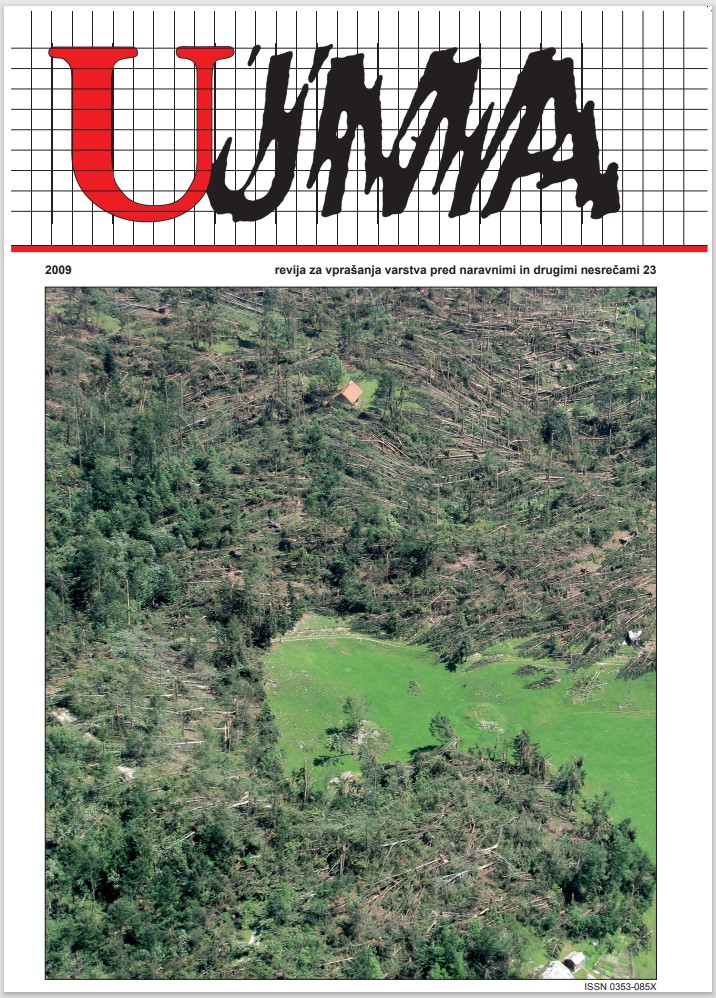FLOODS AROUND THE WORLD DURING 2008
Abstract
Slovenia is a land of headwater sources where floods are mostly caused by torrents and karstic rivers. On a global scale, flows of Slovene rivers are relatively low. Therefore the biggest rivers in the world cause bigger floods than those that are found in Slovenia. The Dartmouth Flood Observatory in the USA systematically monitors flooding conditions in the world. In the present article, the basic characteristics of floods as a type of hydrologic phenomena are presented as well as floods that occurred in 2008. The overview of the biggest and the most important floods in Europe and the world during 2008 is given. During this year, floods resulting from the passage of Nargis Cyclone in Myanmar caused the highest death toll. According to the DFO’s estimation, the floods during the La Ni a event, on the other hand, reached the highest magnitude. On a global scale, floods in Slovenia during 2008 were not significant.
References
ABC Western Queensland, 2008. Western rivers in flood - January 2008. Medmrežje: http://www.abc.net.au/local/stories/2008/07/31/2320282.htm (21/1/2009)
Bureau of Meteorology, Queensland, 2008a. Central and Western Queensland Floods, January 2008. Bureau of Meteorology - Queensland, Bureau of Meteorology, Australian Government. Medmrežje: http://www.bom.gov.au/hydro/flood/qld/fld_reports/reports.shtml (21/1/2009)
Bureau of Meteorology, Queensland, 2008b. Central South East Queensland Floods, January 2008. Bureau of Meteorology - Queensland, Bureau of Meteorology, Australian Government. Medmrežje: http://www.bom.gov.au/hydro/flood/qld/fld_reports/reports.shtml (21/1/2009)
DFO – Dartmouth Flood Observatory, 2009. Global Flood Detection, Mapping, and Measurement. http://www.dartmouth.edu/~floods/index.html (5/2/2009).
Frantar, P., 2008 a. Poplave — njihove značilnosti in poplavne razmere v Sloveniji. Geografski obzornik, letnik 55, št. 3, str. 10—16.
Frantar, P., 2008b. Poplavne razmere v Evropi in svetu. Geografski obzornik, letnik 55, št. 4, str. 4—10.
Gams, I., 1991. Poplave – povodenj – ujma. Ujma, št. 5, str. 271—272.
GDACS - Global Disaster Alert and Coordination System, 2008. Red Flood alert in India. Medmrežje: http://www.gdacs.org (22. 1. 2009).
Marsh, W. M., Grossa, J., 2005. Environmental Geography. Science, Land use, and Earth Systems. 3rd Edition. John Wiley & Sons. Hoboken.
Medmrežje 1: Wikipedia: El Ni o-Southern Oscillation. http://en.wikipedia.org/wiki/El_nino (11/2/2009)
Medmrežje 2: Wikipedia: Flood. http://en.wikipedia.org/wiki/Flood (15/11/2008)
Medmrežje 3: Wikipedia: Majuli. http://en.wikipedia.org/wiki/Majuli (14/1/2009)
Medmrežje 4: Wikipedia: Poplava. http://sl.wikipedia.org/wiki/Poplava (15/11/2008)
Medmrežje 5: ZAMG. http://www.zamg.ac.at (14/1/2009)
Mikoš, M., Kranjc, A., Matičič, B., Müller, J., Rakovec, J., Roš, M., Brilly, M., 2002. Hidrološko izrazje. Acta hydrotechnica 20/32 (2002), Ljubljana.
NASA EO – NASA Earth Observation, 2008. Floods in Eastern France. Medmrežje: http://earthobservatory.nasa.gov/NaturalHazards/view.php?id=35795 (21/1/2009)
NCDC – National Climatic Data Center, 2008. Climate of 2008, Annual Review,
Significant U.S. and Global Events. National Climatic Data Center, 16 December 2008. Medmrežje: http://www.ncdc.noaa.gov/oa/climate/research/2008/ann/events.html
O’Connor, J. E., Costa, J. E., 2004. The world’s largest floods, past and present—Their causes and magnitudes: U.S. Geological Survey Circular 1254, 13 p.
Plut, D., 2000. Geografija vodnih virov. Filozofska fakulteta, Oddelek za geografijo. Ljubljana.
Richter, B. D., Baumgartner, J. V., Wigington, R., Braun, D. P., 1997. How much water does a river need? Freshwater Biology 37: 231-249. Wiley-Blackwell.
WMO, 2008. Press Release No.835. Medmrežje: http://www.wmo.int/pages/mediacentre/press_releases/pr_835_en.html (19/12/2008)
Downloads
Published
Issue
Section
License

This work is licensed under a Creative Commons Attribution-NonCommercial-NoDerivatives 4.0 International License.
The articles are made available to the public under Creative Commons Attribution-NonCommercial-NoDerivatives 4.0 International (CC BY-NC-ND 4.0).


